Chemistry behind the scenes; Mrs. Kathy Groat, Ms. Nina Ferrant, and the NPHS Lab Aides
December 11, 2014
TOWAMENCIN – Famous quantum chemist Linus Pauling once said “Every aspect of the world today – even politics and international relations – is affected by chemistry.” For Pauling and other scientists, a science education was important to their own future careers. However, a scientific knowledge is also important for any student across all subjects, because it teaches a person to visualize how certain aspects of the world work, while also showing us the laws and properties that affect our lives on a daily basis.
North Penn’s science program is one of the best in the area, and part of that can be attributed to the teaching staff and the work the science department as a whole puts into the curriculum. But another, lesser known group is responsible for the nuts and bolts of it all, putting in countless hours behind the scenes to put together the necessary chemicals and materials to make all of the experiments in the school run smoothly.
This group is the Lab Aides, a collection of five students who work after school to make the science program run without a hitch. Advised by Mrs. Kathy Groat and Ms.Nina Ferrant, these students put together and set up the materials required for students of any level class to run successful experiments. Diluting solutions of particular molarity and setting up the required materials for each lab, the Lab Aides put together lab carts that teachers then use to conduct experiments within their classes. While not as well known around North Penn, the Lab Aides are essential to almost every student’s science education.
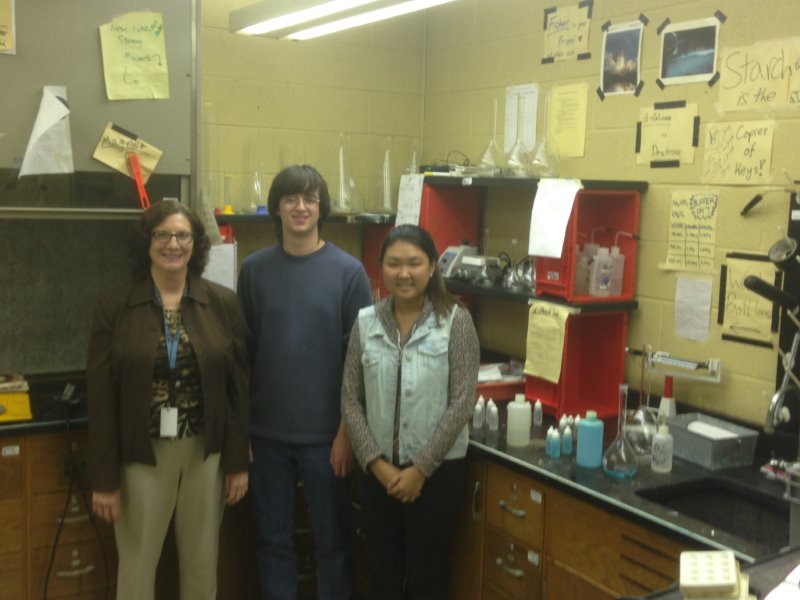
Ms. Nina Ferrant stands with NPHS students Pat Lockwood and Ella Kim as they work behind the scenes in the chem department at NPHS
“It’s a shame, people don’t really know about it at all. I know here in K-pod, we run about a hundred experiments throughout the course of the year for four courses, excluding Bio. There’s a little bit of overlap between 5.0 and intro, but applied chemistry and honors chemistry are completely different than 5.0 and intro,” said Groat. “Some of them are simple, they might just need some metal, and some are a lot more complicated, where they will need specific molarities of solutions. The students have to calculate and figure out exactly what they need to make these dilutions.”
Groat and Ferrant have spent years building the program, and although they come from different background, their arrival at North Penn has provided the foundation for the success of the Lab Aides.
Groat, who teaches 5.0 chemistry, discovered a love for chemistry at a very young age, deciding at the age of fifteen that she wanted to pursue a career in science. After graduating college with a bachelors in chemistry, Groat pondered a career in forensics or law, even taking the LSATS. But her love of chemistry and teaching ultimately brought her down the path of education.
“I decided on my first day of student teaching that this is what I wanted to do. I loved it immediately. I had a wonderful high school chemistry teacher, and that was kind of my inspiration,” said Groat. “I searched the entire state, and even though I’m from Pittsburgh, there were not many science openings. So I came out here and interviewed, and got the job. I started at Penndale Middle School for five years as a ninth grade physical science teacher, and then I’ve been here for the last twenty.”
Ferrant, who teaches Applied and Advanced Biology, took a much longer, diverse path to get to North Penn, working in the IchemE industry, as an attorney, and even running her own business. But her work before teaching has brought more industrial experience to the Lab Aides and the classroom.
“I have only been teaching since 2000; I come from industry, so I did other things before teaching,” said Ferrant. “I used to teach in Philadelphia, and after I taught there for a few years, I decided to come out here because I had been the only chemistry teacher there and it was cool to come here and be with a group of ten.”
Groat and Ferrant have both worked to build Lab Aides into the program it is today.
The group is comprised of five students, usually Juniors and Seniors, who are taking or have taken AP Chemistry as a Junior. With three students in K-Pod and two in C-Pod this year, the Lab Aides follow pre-made instruction books made by Groat and Ferrant to set up the lab carts. Teachers email Groat or Ferrant with a lab request, and the Lab Aides calculate and make the diluted solutions necessary while also setting up a lab cart for that teacher.
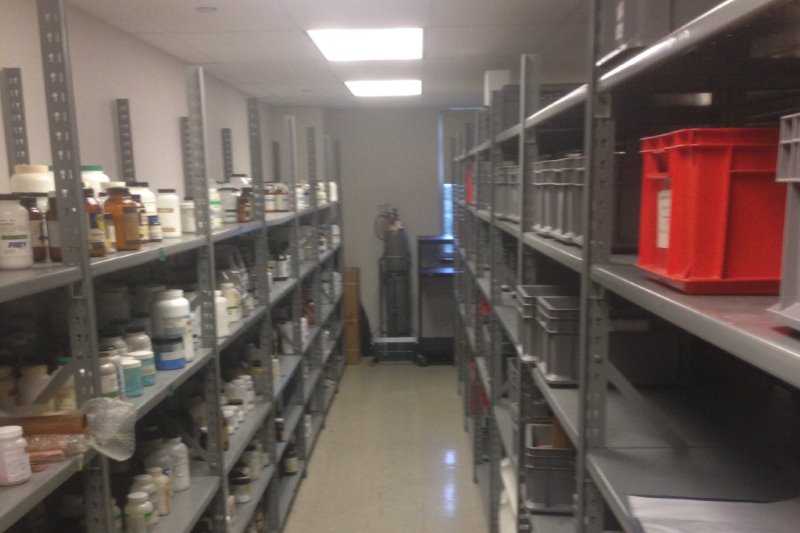
BEHIND CLOSED DOORS – The NPHS Lab Aides work tirelessly to organize and prepare all the components needed for each chem lab that is run at NPHS.
“It started in 1982, so it has been about thirty-three years. Once we split, and K-pod was built in 1999, we needed two people to run because it was just too big. So, we have somebody in K-pod and C-pod,” explained Groat. “We try to rotate so we always have one person who has been there and one person who is new, and that creates a little bit of continuity, but they are all bright and catch on very quickly.”
Groat presides over the Lab Aides in K-Pod, Stephen Thornton, Rudmila Rashid, and Joe John, while Ferrant advises the Lab Aides in C-Pod, Patrick Lockwood and Ella Kim. While being a Lab Aide is a job, the requirements and day to day proceedings go further than the average high school occupation. K-Pod Lab Aides handle mostly chemistry courses, while C-Pod Lab Aides handle a larger variety of courses, such as AP Biology and AP Chemistry.
“I like it, it’s fun,” said Patrick Lockwood. “It looks very good on a college application, and it is impressive to other people in the field.”
“A lot of people don’t know about it. It keeps us on our toes, because there are a lot of different labs to prepare,” said Ella Kim.
While they have organized the program, written the instructions, and advise the group throughout the course of the year, Ferrant and Groat are quick to point out the importance and success of the Lab Aides and all that they do, both at North Penn and beyond.
““They are all very brilliant, and they all show up all the time. They work very hard, and they do not need much direction. They know what they need to do, and they have figured out the system very well,” said Groat. “They help create a consistent program, so that from teacher to teacher the students are given a very consistent program.”
“They work very hard, they are very organized, and the most important thing is that they are responsible. They are here when I need them to be here, and if I ask them to do something I know it’s going to get done, and it’s going to get done right,” said Ferrant. “I also know that if they have any questions, they are not afraid to figure it out correctly. It is very important in a job like this, where you’re doing a lot of different things, if you are not sure of what you need to do you get assistance.”
A group of this size can be lost in the everyday mania that is North Penn High School. But a job like Lab Aides shows the depth of involvement that students can experience, the contributions that they make, and the overall high standards and quality science education that is achievable at North Penn. An education in the Sciences provides students, whether they intend to pursue a future in science or not, with a fundamental knowledge of how the world works, something not lost on Groat or Ferrant.
“I think, chemistry is obviously abstract, and being able to do the experiments enables students to visualize those abstract concepts,” said Groat. “Having a central program, a group like this, provides a consistent program from teacher to teacher, which is beneficial to a students education.”
“I think it helps everybody, because it trains your mind. Everyone needs to have an understanding of the universe and how the world works. Anyone who wants to go on in science has to have a foundation in all of these courses, and our active laboratory program gives them a very good training,” said Ferrant. “But I think everybody needs to have some grounding in science so you can understand how your body works, why the climate changes. It’s important that the kids have the ability to reason through things based on evidence.”
The ability to visualize and to think of abstract concepts concretely allows for not only scientific discovery, but innovation across all fields of knowledge, whether it be politics, technology, advertising, or acting. By teaching a student to think scientifically, you teach them to focus on how parts affect the whole and imbibe in them the skills necessary to spark innovative and practical ideas. The Lab Aides, with the guidance of Groat and Ferrant, help teachers to give students these skills, and their work is used to teach kids in every classroom. Such a little known group has come to impact almost every student who enters the doors of North Penn, from sophomore Biology to AP Chemistry and Advanced Biology, and their contributions are one of the factors that makes North Penn such an established learning institution.


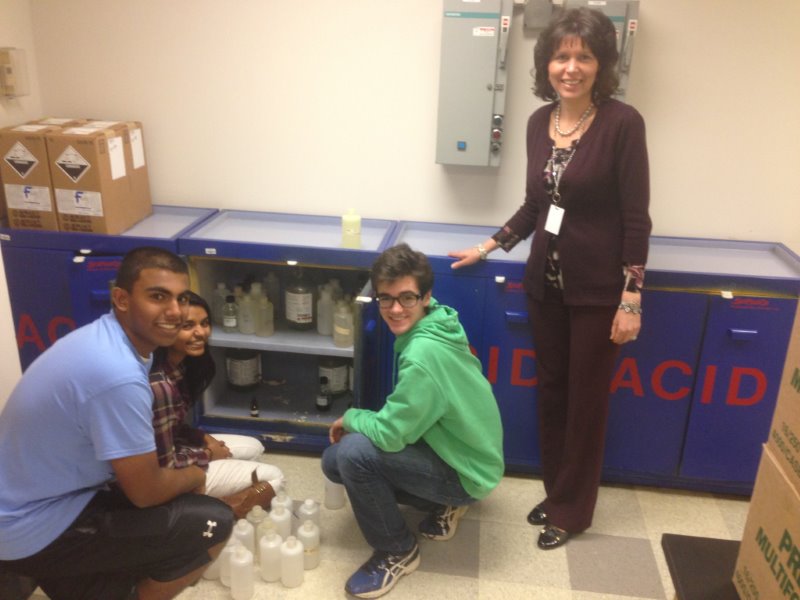




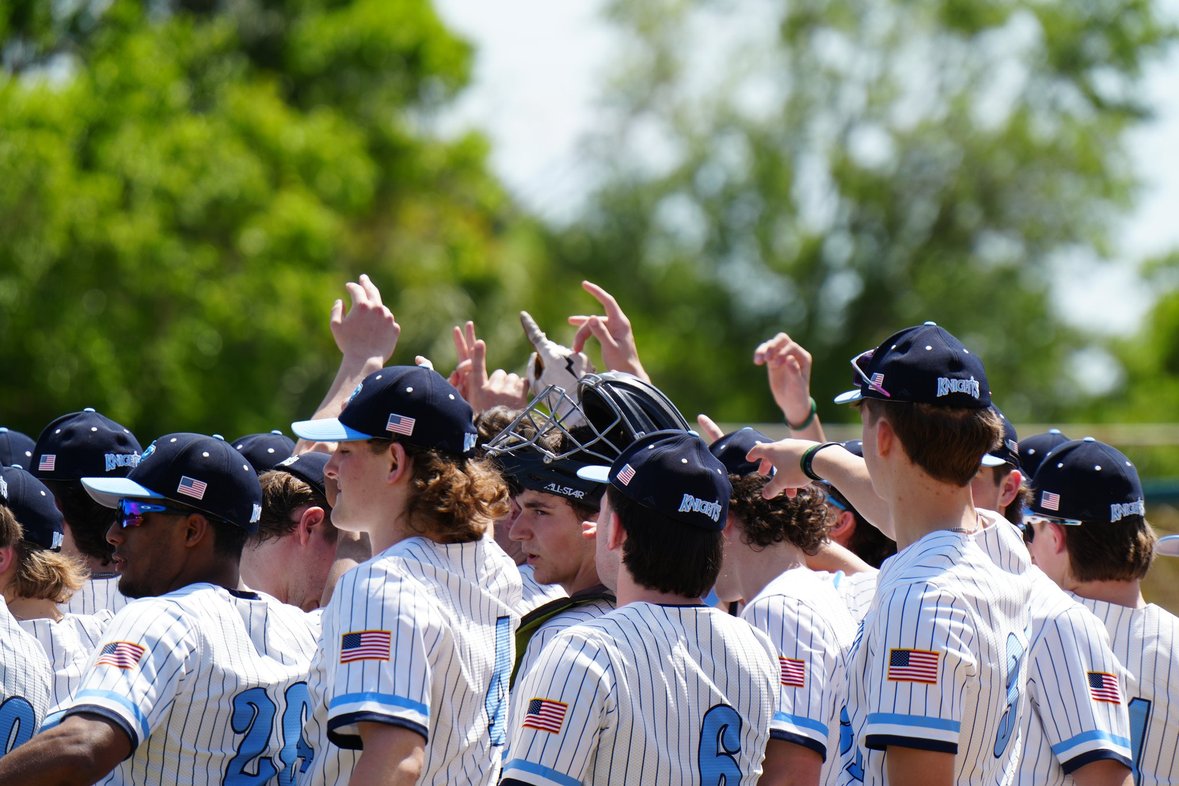
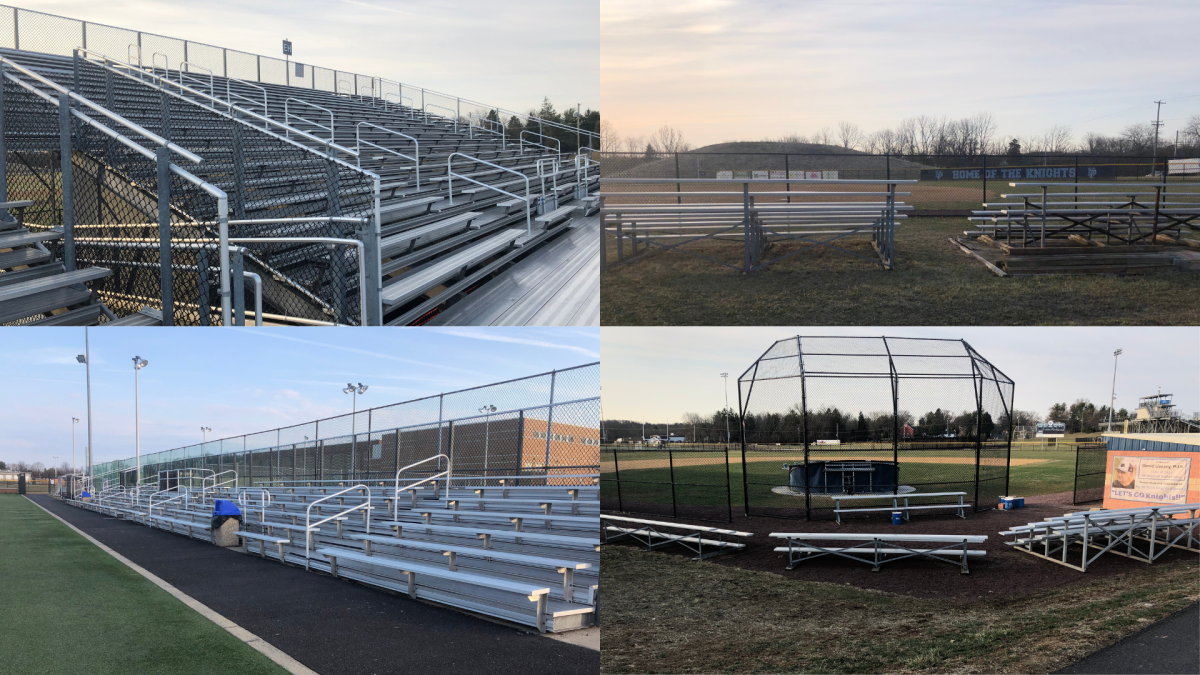


Groatp.2.2014 • Jan 9, 2015 at 9:04 pm
I had Ms. groat and she was possibly by far the best science teacher I had last year!! She’s very humerous and can adapt a lesson when the schedule was messed up last year. She treated the class like a true 5.0 class which was actually challenging. Its a shame my nomination for her teacher of the year did not work. But it’s glad know she gets well deserved credit for her work. I think the not so well known teachers are always the best teachers!!